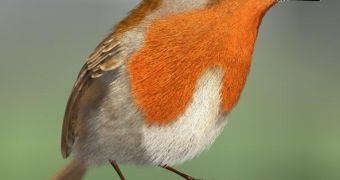What's the connection between a nuclear explosion and a bird's feathers? Well, the brighter the bird, the more exposed it is to radiation, as found by a new research examining bird populations around the 1986 nuclear disaster zone at Chernobyl, Ukraine.
The same compounds that many birds employ to give color to their feathers are also used to fight off the cancer-causing free radicals that boom inside the body after exposure to radiation, so when birds have to hijack these compounds for their plumage, they remain less protected, as researchers speculate.
Other scientists have shown that animals presenting shortages of carotenoids (powerful antioxidants) are more prone to suffer from DNA damage in the presence of radiation than other individuals, as antioxidants suppress the damaging free radicals created by radiation.
The team made of Anders M?ller, an ecologist at the Universit? Pierre et Marie Curie in Paris and Timothy Mousseau, a biologist at the University of South Carolina, wanted to see if birds that require more carotenoids are, by extension, more vulnerable in radioactive environments.
The biologists made a list of bird species living in 257 locations around Chernobyl and compared these to the radiation levels in these areas. The populations of birds with yellow, orange and red feathers (colors given by carotenoids located into the feathers) were much reduced in the radioactive areas, when compared to other areas, than the populations of birds with plumage colors not involving carotenoids.
This finding strengthens the idea that antioxidants are crucial in protecting animals against radiation. Birds using their available antioxidants for the plumage were less likely to survive after nuclear contamination.
"We found that bird species differed in their response to radiation from Chernobyl. Although all species must cope with the potentially detrimental effects of free radicals, because of their use of antioxidants, certain species are predisposed to suffer most from these negative effects." wrote the researchers.
The research also showed that the birds that migrate and disperse over long distances, but also those that lay large eggs, are more affected by radiation than other species.
"This is thought to be because strenuous physical activity-such as flying-and egg formation use up antioxidants too," they wrote.

 14 DAY TRIAL //
14 DAY TRIAL //